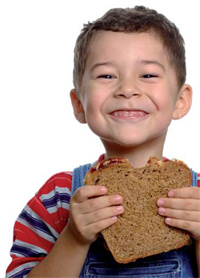Many parents often do not realise the importance of snacking between meals. Eating regular meals have been stressed upon in our society today so much so that frequent snacking has been viewed as a bad thing. However, there are advantages and benefits of snacking and it is an essential part of a growing child’s diet.
Snacking is Important…
Really?
Snacking, which has been viewed as just munching in-between meals, is in reality an essential part of a child’s daily menu. This is because energy levels naturally drop several hours after a main meal and snacks are needed to maintain these energy levels throughout the day. However, not all snacks are equal! Healthy and nutritious snacks help in boosting energy levels, thus enabling children to perform to the best of their capabilities.
Add in the Essentials
Planning healthy snacks for your children need not be tedious and difficult. Refer to the food pyramid as a guide and keep in mind some of the nutrients that should be present in your child’s diet to maintain and boost his energy levels. These include:
- Fibre – important to keep the digestive system healthy and to avoid constipation, especially in younger children.
- Carbohydrates – major source for energy.
- Protein – builds muscles and other tissues in the body such as the organs.
- Vitamins and minerals – help boost the immune system, support normal growth and development.
A combination of these nutrients makes up a healthy snack that will provide your child with the necessary nutrients needed to get through his day.
Creative and Attractive Snack Ideas!
Healthy snacks need not be boring and bland; they can actually comprise of a large variety of tasty foods.
| Be Creative… |
|---|
|
It is common for children to prefer snacks such as pretzels, potato chips as well as cheese crackers or chewy fruit snacks. Although these snacks are marketed as healthy and low fat, they are actually high in sugar and sodium. Here are more tips in which you could use to promote a healthier snacking:
- No junk food in the house. Do not stock up on chips or cookies; instead buy healthy snacks such as high-fibre crackers, cereal bars and plenty of fresh fruits. Children will look for other options if they are hungry enough.
- Quick cook meals. These meals do require some cooking, but are simple, healthy and easy to prepare! Make mini sandwiches of egg/tuna/cheese, cook up some French toast or corn-incup (limit the margarine and do not add any more salt).
- Keep it simple and nutritious. Some ready-to-eat snacks are both tasty for your child and easy for you! Get some popiah basah, tau fu fah or steamed pau for a healthy snack.
- Offer a variety. Always offer a variety of healthy snacks that they can choose from, which also allows them to be in the habit of choosing healthy snacks in the future.
Never Restrict Anything Completely
Do not restrict sugary snacks completely. Instead, set limits and provide them as treats, yet not to be given out everyday. Eliminating these foods from a child’s diet may make them crave for them even more. Make sure that snacks are not given too close to mealtimes as this can ruin your child’s appetite. Limit snacks to at least 2 hours before a main meal and never let snacks be a replacement of the main meals!
With good knowledge of which foods contain the nutrients necessary for your child’s growth, planning and preparing healthy snacks will be a breeze!






Comments